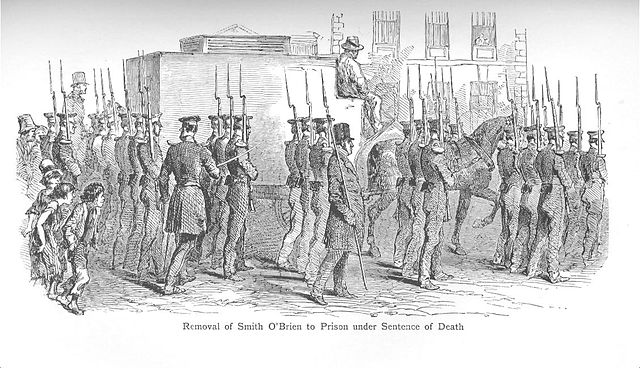William Smith O'Brien was an Irish nationalist Member of Parliament (MP) and a leader of the Young Ireland movement. He also encouraged the use of the Irish language. He was convicted of sedition for his part in the Young Irelander "Famine Rebellion" of 1848 but his sentence of death was commuted to deportation to Van Diemen's Land. In 1854, he was released on the condition of exile from Ireland, and he lived in Brussels for two years. In 1856 Smith O'Brien was pardoned and returned to Ireland, but he was never active again in politics.
Portrait by George Francis Mulvany
"Young Ireland in Business for Himself", John Leech's satirical 1846 cartoon for Punch magazine showing Smith O'Brien offering "pretty little pistols for pretty little children" after the withdrawal of the Young Irelanders from the Repeal Association
Removal of Smith O'Brien under sentence of death
Daguerrotype of Thomas Francis Meagher, William Smith O'Brien with soldier and jailer in Kilmainhaim Gaol, 1848.
Young Ireland was a political and cultural movement in the 1840s committed to an all-Ireland struggle for independence and democratic reform. Grouped around the Dublin weekly The Nation, it took issue with the compromises and clericalism of the larger national movement, Daniel O'Connell's Repeal Association, from which it seceded in 1847. Despairing, in the face of the Great Famine, of any other course, in 1848 Young Irelanders attempted an insurrection. Following the arrest and the exile of most of their leading figures, the movement split between those who carried the commitment to "physical force" forward into the Irish Republican Brotherhood, and those who sought to build a "League of North and South" linking an independent Irish parliamentary party to tenant agitation for land reform.
Charles Gavan Duffy
Thomas Davis
Thomas Francis Meagher
Depiction in Punch (1846) of the split: "Young Ireland in Business for Himself", Smith O'Brien in Repeal cap sells weapons to a stereotyped Irishman.







